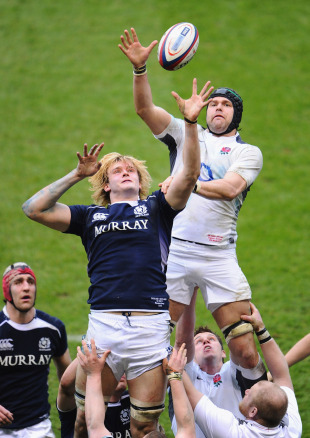|
Comment
Unhappy families
Iain Morrison
March 15, 2011

The lineout was another area of worry for Scotland against England
© Getty Images
Enlarge
Leo Tolstoy's thumping great book Anna Karenina starts off with the following memorable line: "All happy families are alike; every unhappy family is unhappy in its own way." The same applies to success and rugby teams. The successful sides follow a pretty similar template with only modest deviation while the losing ones find a new way to muck it up every successive weekend. Scotland went into this Six Nations with high hopes and perfectly reasonable expectations. The level-headed pundits were predicting that three home wins against Wales, Ireland and Italy was perfectly doable and if they could raise a head of steam in Paris or London, never very happy hunting grounds, the Jocks might just finish in the top half of the table for the first time in over a decade. Oh dear! If it could go wrong it has done. With one weekend of action still to come, every team can take something from this Championship to date except the Scots, who are winless, pointless and largely unloved, propping up the bottom of the table. Ireland boast a 50% record while playing well below their capabilities and they should, of course, have won in Cardiff. Wales brought to an end their dreadful losing streak to record three successive victories after pushing England close in the opening match. England are going for a Grand Slam, their first since 2003, and even the poor benighted French played some good stuff against Scotland and England before hitting the self destruct button in Rome. The Scots have found tries hard to come by so when they scored three in Paris there was justifiable jubilation, but they should not have celebrated losing to a French team that has been proven ordinary if not downright poor. Moreover, the Scots' previous wins were all built on the solid foundation of a granite defence, which turned to sand in Paris. They made a miserable 89% of their tackles and only Richie Gray's athletic excellence prevented a few more French scores. The Scots went into the Wales match as favourites and that alone should have set the alarms bells ringing. The management and players alike will insist that they were not overconfident and they will both be lying. The defensive stats were better (Scotland misses 6 tackles all day against Wales' 14) but the old issue of finishing returned to haunt the hosts, who dominated possession and territory but couldn't beg, borrow or buy a try. Discipline was also an issue, with the home team conceding five penalties within the opening 23 minutes - three of which James Hook converted. Against Ireland the discipline was good but the defence was hopeless (12 missed tackles) and the visitors were presented with two of the softest tries they will ever score. A new problem also reared its head...the set-piece. Ireland scored one try directly from a scrum and another from a lineout after two, maybe three, plays. The set-piece that creaked against Ireland collapsed completely at Twickenham. It was a disaster. The Scots lost four lineouts as they utilised ever more complex throws/calls and they were penalised at innumerable scrums. Every time they lost a set-piece play England got the ball for an average of (say, roughly) 90 seconds. So a total of 10 lost set-piece plays (4 lineouts/6 scrums) meant that England had possession for (roughly) 15 minutes longer than would otherwise have been the case and (thanks to those penalties) many of those phases came 50 metres further downfield than they should have.
Despite all the problems of getting their mitts on the ball, the Scots then decided to kick it away on the rare occasions they won it. Between them Ruaridh Jackson and Dan Parks kicked 50% of possession. It says something about the competitive nature of Andy Robinson's team that they stayed in the game as long as they did. Instead of moving this team on, developing, growing and looking to peak around the Rugby World Cup, the coaching staff has been left fighting fires. No sooner had Andy Robinson plugged a hole in one part of the rust bucket than his squad would spring a leak somewhere else. Sieve-like defence, bizarre decision making, unforced errors, poor conditioning, worse finishing, scrum woes, lineout throws...you name it, the Scots have tried it this Six Nations. They have generally adopted the pick and mix approach so beloved of the lamented Woolworths to ensure a cornucopia of different mistakes every week, rather than relying on just one. So where does that leave them ahead of Italy next Saturday? Nervous, I'd say, very nervous. If the Scots can put together all the best bits of their season to date (the finishing in Paris, the lineout against Ireland, the defensive effort from Twickenham, the possession stats from the Welsh match) they will win at a canter. The danger remains that Robinson's troops are so demoralised that they will find another brand new way to lose. If Italy do win their second match of the competition at Murrayfield, who would deny that they deserve it after pushing Wales and Ireland all the way? © ESPN Sports Media Ltd.
| |||||||||||||||
Live Sports
Communication error please reload the page.
-
Football
-
Cricket
-
Rugby
-
- Days
- Hrs
- Mins
- Secs
F1 - Abu Dhabi GP
Abu Dhabi Grand Prix December 11-131. Max Verstappen ()
2. Valtteri Bottas (Mercedes)
3. Lewis Hamilton (Mercedes)
4. Alexander Albon ()
5. Lando Norris ()
6. Carlos Sainz Jr ()
-
ESPNOtherLive >>
Snooker - China Open
Tennis - Miami Open

